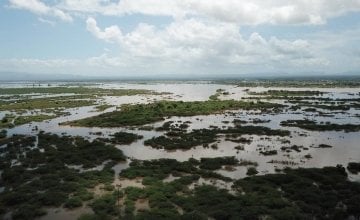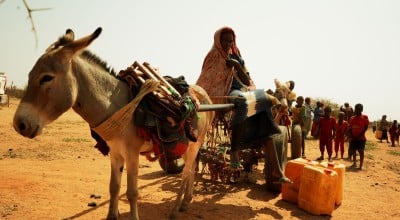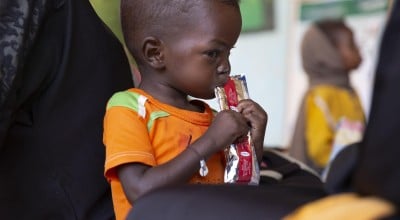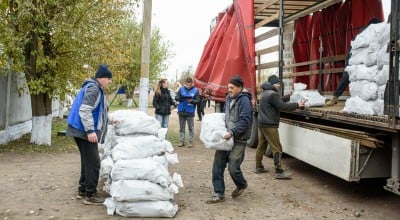
Read our 2024 annual report

Knowledge Hub
Concern Worldwide launches €5 million Cyclone Idai public appeal
Concern Worldwide has launched a public appeal for funds for its humanitarian response to the severe flooding in Malawi which has affected over 900,000 people
Emergency supplies

More than 90,000 people have been displaced after heavy rains and floods washed away their homes, shelter and livestock, and left large swaths of crops submerged. They are currently hosted in 173 temporary camps.
The Malawian government declared a State of National Disaster on March 8 following heavy rains and floods in the southern region. This was followed by cyclone Idai which hit Mozambique last weekend.
“We are currently facing a very dangerous situation where latrines have been damaged and where there are insufficient numbers of toilets and bathrooms in make shift temporary camps, such as schools and churches” Concern’s Country Director in Malawi Yousaf Jogezai said. “This, combined with high water levels, means there is a real risk of water borne diseases such as diarrhoea, Cholera and Malaria.”
A school being used as a temporary camp, visited by Concern last week, which is currently housing 480 people and educating 800 students, had eight toilets and no bathrooms, he said.
Concern is seeking funding for its emergency response which includes providing essential items such as cooking utensils, mosquito nets, soap and other materials including plastic sheeting for immediate shelter for up to 5,000 flood-affected households (22,500 people).
“We will also establish emergency latrines and showers in a number of camps and train people in emergency health and hygiene,” he said Concern and its partners will support and strengthen existing protection mechanisms in place for children who are particularly vulnerable when situations like this occur.
“This is a double disaster for communities in southern Malawi where, even prior to the latest flooding, 3.4 million people were food insecure,” Mr Jogezai said. “Now, just a month before the maize harvest -- what was a very rich crop -- has been destroyed. Between 80% and 100% of the harvest has been lost.”
Maize is the dominant crop and staple in Malawi. Those affected will require food supports and cash transfers for at least the next three months.
“Once the flood waters subside, people will need seeds and tools to enable them commence replanting,” he said. “Work will also be needed to rehabilitate irrigation systems damaged by the floods.”
One of the world's poorest countries
Concern Worldwide has been in Malawi since 2002, and has worked with communities in Nsanje since 2009 and Phalombe since 2015. Both districts have been severely affected by the floods. According to the latest inter agency assessment report, 183,000 people have been affected by the floods and 25,000 have been displaced in these two districts. Nearly 38,000 families have lost crops, livestock. Key roads and other infrastructure have been damaged.
“Parts of eastern Nsanje are still completely cut off by the flood waters and can only be accessed using a helicopter and a boat provided by the Malawi Defence Forces,” Mr Jogezai said.
“Malawi is one of the poorest countries in the world with very little capacity to respond to a natural disaster of this scale,” Concern Worldwide Chief Executive Dominic MacSorley said. “Concern’s team on the ground in Malawi are responding but support from the public and the international community is desperately needed to raise €5 million to fund this work.”
Concern’s key activities in its emergency response will be:
- Provision of non-food Items in 12 camps to meet basic needs (cooking utensils, mosquito nets, soap and other materials including plastic sheeting to provide immediate shelter and preserve the dignity of flood-affected households).
- Establishing basic latrines and showers (separate for men/women) in order to reach recommended “Sphere standards” in 12 camps, plus training in hygiene best practices in the camp context to help prevent cholera and water borne diseases. As part of this work, Concern will work with the Ministry of Health Surveillance Assistants (HSAs) to train and support local community members to work as health and hygiene promoters in camps and affected areas.
The second phase of the response is expected from April/May onwards and will continue for about three months to support people recover from the flooding. We envisage providing agriculture related items (seeds, etc.) to help people produce a ‘winter crop’ which will be feasible in the currently flooded areas as moisture will be retained, plus unconditional cash transfers to assist people restore homes and non-agriculture livelihoods, etc.
Mr MacSorley urged the public to donate to Concern’s Malawi flood appeal by visiting Concern's homepage.
For more information contact Eamon Timmins, Media Relations Manager, at 01 4177712 or 087 9880524 or by email: eamon.timmins@concern.net

Other ways to help
Corporate support
Is your company interested in working together for a common cause?
Fundraise for Concern
From mountain trekking to marathon running, cake sales to table quizzes, there are lots of ways you can support our work.
Buy a gift
With an extensive range of alternative gifts, we have something to suit everybody.
Leave a gift in your will
Leave the world a better place with a life-changing legacy.
Volunteer with Concern
The lots of ways to get involved with our work as a volunteer
School fundraising
Without the generous support from schools, we wouldn't be able to do the work that we do.




